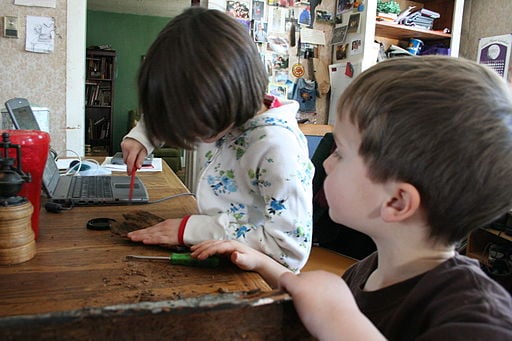“This is where it happened.”
That’s how Ezra began one of his tall tales last year. As he and Jeff were walking by a corner in Central Square, Ezra launched into a story of how my mother was mugged the last time she was in town and crossing the street with Ezra on that very corner. The story was full of just the right details: She said not to tell anyone because no one got hurt. My mother would absolutely say something like that. Some parts went a bit too far: After the policeman threw the guy in the car, he stabbed him in the side. When he realized that Jeff wasn’t buying that flourish, he backed off with: Oh, oh, I got that part confused. He didn’t stab him. He just took the purse and gave it back Amma.
If you put aside fears of Ezra becoming a con artist or career politician, his ability to tell such a good story is a sign that he is well on his way to developing one of the seven essential life skills described in Ellen Galinsky’s most recent book, Mind in the Making – the skill of Communication.
Few people would argue that communication is a critical skill, but to promote it we spend almost all of our time teaching people how to write a coherent paragraph and give oral reports. And that alone will be grossly insufficient at most worksites or in most marriages. The Mind in the Making website says that effective communication:
…involves much more than understanding language, speaking, reading, and writing—it is the skill of determining what one wants to communicate and realizing how our communications will be understood by others.
Communicating well involves executive functions of the brain—for example, reflecting on the goal of what we want to communicate and inhibiting our point of view so that we can understand the viewpoints of others.
Her suggestions on how to promote this kind of communication? Read, read, and read some more. And ask your kids lots of questions about what is happening and what they think will happen next. Encourage them to ask you questions about the story. She also suggests asking kids to tell you stories about their day, asking lots of questions to help them see what details you needed to follow the story. (She, like everyone else, also seems to hint that family dinners are key. But we can’t seem to pull that off most nights, so I’m skipping those pages.)
Storytelling leads directly to Charlotte Masons’ idea of narration, one of a few key elements that define her style of education. During a narration, children tell you back what they heard or experienced, learning to pay attention to relevant details and share them in a manner that is neither missing critical details nor labored with unnecessary information.
As knowledge is not assimilated until it is reproduced, children should ‘tell back’ after a single reading or hearing . . . A single reading is insisted on, because children have naturally great power of attention; but this force is dissipated by the re-reading of passages…The teacher does not talk much and is careful never to interrupt a child who is called upon to ‘tell.’ The first efforts may be stumbling but presently the children get into their ‘stride’ and ‘tell’ a passage at length with surprising fluency…Narrations which are mere feats of memory are quite valueless.
We do a lot of narration these days. We do it after Bible study in the morning, after most stories and history tales throughout the day, and after coming home from exciting adventures. Sometimes, we just let the kids tell us the story. Other times, we write it down word for word. They are not asked to write their narrations themselves because until age 9, according to the method, their writing skills can’t keep up with their telling skills. At 9, you start letting them write some of their narrations on their own.
Ezra, as noted above, has always been a skilled liar, I mean storyteller. Zach not so much. But in just over a month of doing these narrations, I can see him stop on occasion to think about how to narrate a story so that it will make sense to me, something he never seemed too concerned with before.
It’s only day 3 of comparing Ellen’s work with Charlotte’s; but so far, Victorian-era Charlotte seems to be rockin’ the essential skills. Without once referring to multiple regression analysis. Hmmmm.











